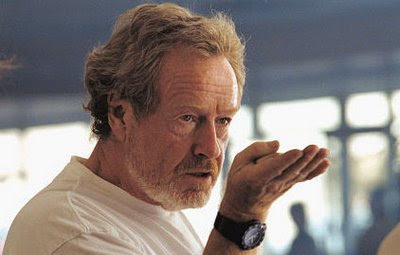
The following essay is a unique collaboration of Daily Film Dose and A Penny in the Well – two bloggers and Ridley Scott fans with strong opinions about the notion of the so-called ‘Director’s Cut’.
Click HERE to read Part I at Alan Bacchus’ Daily Film Dose
Click HERE to read Part I at Alan Bacchus’ Daily Film Dose
GLADIATOR
Original Cut (2000) 155 mins
Extended Cut (2005) 171 mins
“This is not the director’s cut. The director’s cut is the length that went out into theaters. The one you’ve probably already seen. This one has a lot of scenes in it that were removed that might be worth seeing.” These are the brief and blunt words Scott uses to explain the existence of “Gladiator: Extended Edition” in his video introduction to the film on its 3-disc set. This Best Picture Oscar winner became a rare prize winner from the first half of an awards year. Yet somehow it seems to lack much of the depth of Scott’s best work. It tells the tale of a once valued general of the Roman Empire who finds his favor betrayed when a new Cesar takes power. He winds up a slave and takes his revenge by becoming a favorite gladiator in the Coliseum. The new scenes don’t really add much to the story, nor do they detract from it. Although it claimed Scott’s only Best Picture Oscar so far, its power lay more within its spectacle than anything else.
BLACK HAWK DOWN
Original Cut (2001) 144 mins
Extended Edition (2006) 152 mins
The extended edition of Scott’s Oscar winning “Black Hawk Down” is strange in that it was an alternate cut of a film released by the studio without any fanfare what-so-ever. It is like the child no one noticed. It was released in a no frills, single disc edition, without the slightest fingerprint from Scott on it. The studio reinserted about ten minutes of deleted scenes that have little effect on how the film plays. Those scenes can be found in the extras of the Scott-approved 3-disc Deluxe Edition released in 2003. Despite the lackluster handling of the extended edition, “Black Hawk Down” remains one of Scott’s finest accomplishments. It is a very accurate adaptation of Mark Bowden’s book recalling the true events of a failed military mission in the heart of the gang-ruled Somalian city of Mogadishu that left 18 U.S. soldiers dead and many others wounded in 1993. Initially criticized for its lack of character development, this film succeeds in placing the audience into the harrowing combat environment these soldiers found themselves thrown.
KINGDOM OF HEAVEN
Original Cut (2005) 145 mins
Director’s Cut (2006) 194 mins
In the introduction to the four-disc DVD set of “Kingdom of Heaven: The Director’s Cut” Scott says, “This is the director’s cut, i.e. the version that I prefer.” It is one of his most underrated films in either version, but the director’s cut is infinitely better than the theatrical cut. He has cast it in the mold of the great David Lean epics “Lawrence of Arabia” and “Dr. Zhivago” with an opening overture, an intermission, and 194 minute running time. It is the story of Balian, who joins the Crusades and travels to Jerusalem in search of redemption. This version includes in-depth character development in its early passages, including important details about Balian’s relationship with his father and the man he kills inspiring his quest. It also reveals an entirely deleted subplot involving Balian’s love interest Sibylla. Her story parallels Balian’s with her own fall from grace.
AMERICAN GANGSTER
Original Cut (2007) 157 mins
Extended Cut (2008) 176 mins
Last week Ridley’s latest extended edition arrived on DVD—“American Gangster”—his low key but entertaining 70’s gangster film. Again, Scott makes it clear on the DVD introduction that the theatrical version is the ‘Director’s Cut’. Of the added 18mins, the most significant change is the extended ending. The theatrical cut ended with Frank Lucas being released into the 1990’s after 16 years in prison. For the audience it was unclear how Lucas’ new life would play out—re-educating himself back into a new generation of crime, or continuing on the straight and narrow. The extended cut has Russell Crowe’s character Richie Roberts meeting him on the outside and walking with him through the streets of New York. Its clearer Lucas’ friendship with Roberts will mean a legitimate path in life. Judge for yourself, but the theatrical cut is arguably more powerful with the hint that Lucas’ ambitiousness might once again put him back on top of the New York crime world.
25 years after “Blade Runner” was released in theaters, Scott finally seems to be satisfied with his release of “Blade Runner: The Final Cut.” He also achieved personal satisfaction with the director’s cuts of “Legend” and “Kingdom of Heaven” and the theatrical releases of the other titles mentioned in this article. But for some reason the studios and even fans insist on asking for more from this talented director. That speaks to the strength of his work and ensures that there will be many more versions of the films of Ridley Scott to come.





No comments:
Post a Comment